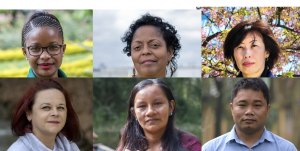 The Goldman Environmental Prize is the world’s largest and most prestigious annual award for grassroots environmentalists. Many people refer to it as the “green Nobel.” Goldman Prize winners are models of courage, and their stories are powerful and truly inspiring. “The Prize recognizes individuals for sustained and significant efforts to protect and enhance the natural environment, often at great personal risk. Each winner receives a financial award. The Goldman Prize views ‘grassroots’ leaders as those involved in local efforts, where positive change is created through community or citizen participation in the issues that affect them. Through recognizing these individual leaders, the Prize seeks to inspire other ordinary people to take extraordinary actions to protect the natural world.” Over the 34 years that the Prize has been awarded, there have been more than 215 recipients of the prize.
The Goldman Environmental Prize is the world’s largest and most prestigious annual award for grassroots environmentalists. Many people refer to it as the “green Nobel.” Goldman Prize winners are models of courage, and their stories are powerful and truly inspiring. “The Prize recognizes individuals for sustained and significant efforts to protect and enhance the natural environment, often at great personal risk. Each winner receives a financial award. The Goldman Prize views ‘grassroots’ leaders as those involved in local efforts, where positive change is created through community or citizen participation in the issues that affect them. Through recognizing these individual leaders, the Prize seeks to inspire other ordinary people to take extraordinary actions to protect the natural world.” Over the 34 years that the Prize has been awarded, there have been more than 215 recipients of the prize.
This year’s prize recipients (representing each of the six inhabited continental regions of the world) are:
- Diane Wilson—Texas, USA: “In December 2019, Diane Wilson won a landmark case against Formosa Plastics, one of the world’s largest petrochemical companies, for the illegal dumping of toxic plastic waste on Texas’ Gulf Coast. The $50 million settlement is the largest award in a citizen suit against an industrial polluter in the history of the US Clean Water Act. As a part of the settlement, Formosa Plastics agreed to reach ‘zero-discharge’ of plastic waste from its Point Comfort factory, pay penalties until discharges cease, and fund remediation of affected local wetlands, beaches, and waterways.” (Support/follow: San Antonio Bay Waterkeeper)
- Alessandra Korap Munduruku—Brazil: “Alessandra Korap Munduruku organized community efforts to stop mining development by British mining company Anglo American in Brazil’s Amazon rainforest. In May 2021, the company formally committed to withdraw 27 approved research applications to mine inside Indigenous territories, including the Sawré Muybu Indigenous Territory, which contains more than 400,000 acres of rainforest. The decision protects a critically threatened area of the Amazon—the world’s largest rainforest and a globally significant carbon sink—from further mining and deforestation.” (Support/follow: Associação Indígena PARIRI, APIB, Amazon Watch, COIAB, and sign this letter.)
- Tero Mustonen—Finland: “Since April 2018, Tero Mustonen led the restoration of 62 severely degraded former industrial peat mining and forestry sites throughout Finland—totaling 86,000 acres—and transformed them into productive, biodiverse wetlands and habitats. Rich in organic matter, peatlands are highly effective carbon sinks; according to the IUCN, peatlands are the largest natural carbon stores on Earth. Roughly one-third of Finland’s surface area is made up of peatlands.” (Support/follow: Snowchange Cooperative and Global Peatlands Initiative)
- Delima Silalahi—Indonesia: “Delima Silalahi led a campaign to secure legal stewardship of 17,824 acres of tropical forest land for six Indigenous communities in North Sumatra. Her community’s activism reclaimed this territory from a pulp and paper company that had partially converted it into a monoculture, non-native, industrial eucalyptus plantation. The six communities have begun restoring the forests, creating valuable carbon sinks of biodiverse Indonesian tropical forest.” (More here; and support/follow the Rainforest Action Network (RAN).)
- Chilekwa Mumba—Zambia: “Alarmed by the pollution produced by the Konkola Copper Mines operation in the Copperbelt Province of Zambia, Chilekwa Mumba organized a lawsuit to hold the mine’s parent company, Vedanta Resources, responsible. Chilekwa’s victory in the UK Supreme Court set a legal precedent—it was the first time an English court ruled that a British company could be held liable for the environmental damage caused by subsidiary-run operations in another country. This precedent has since been applied to hold Shell Global—one of the world’s 10 largest corporations by revenue—liable for its pollution in Nigeria.” (See Conservation Lower Zambezi and sign their petition.)
- Zafer Kizilkaya—Turkey: “In collaboration with local fishing cooperatives and Turkish authorities, Zafer Kizilkaya expanded Turkey’s network of marine protected areas (MPAs) along 310 miles of the Mediterranean coast. The newly designated areas were approved by the Turkish government in August 2020 and include an expansion of the MPA network by 135 square miles (350 sq. km) of no trawling/no purse seine, and an additional 27 square miles (70 sq. km) of no fishing zones. Turkey’s marine ecosystem has been severely degraded by overfishing, illegal fishing, tourism development, and the effects of climate change—and these protected areas help mitigate these challenges.” (Support/follow: Mediterranean Conservation Society)
Click on each recipient’s name to read a longer profile—or watch a brief video—about their remarkable efforts and achievements, and to find links to their social media pages.
Here’s the video about Diane Wilson:
Posts on Goldman Prize winners from previous years:
- Goldman Prize Winners, 2022
- Goldman Prize Winners, 2021
- Goldman Prize Winners, 2020
- Goldman Prize Winners, 2019
- Goldman Prize Winners, 2018
- Goldman Prize Winners, 2017
- Goldman Prize Winners, 2016
- Goldman Prize Winners, 2015
- Goldman Prize Winners, 2014
- Goldman Prize Winners, 2013
- Goldman Prize Winners, 2012
- Goldman Prize Winners, 2011
- Goldman Prize Winners, 2010


